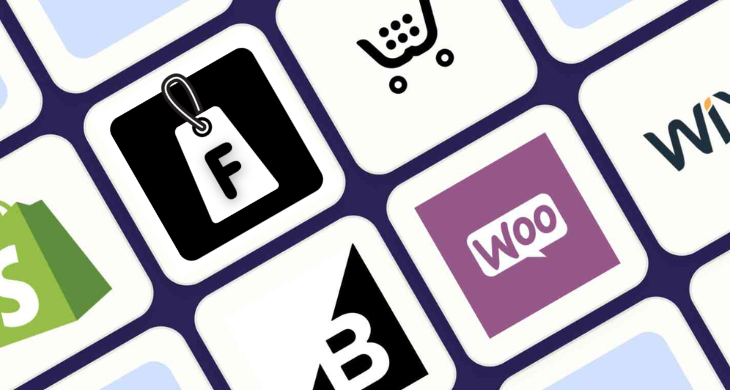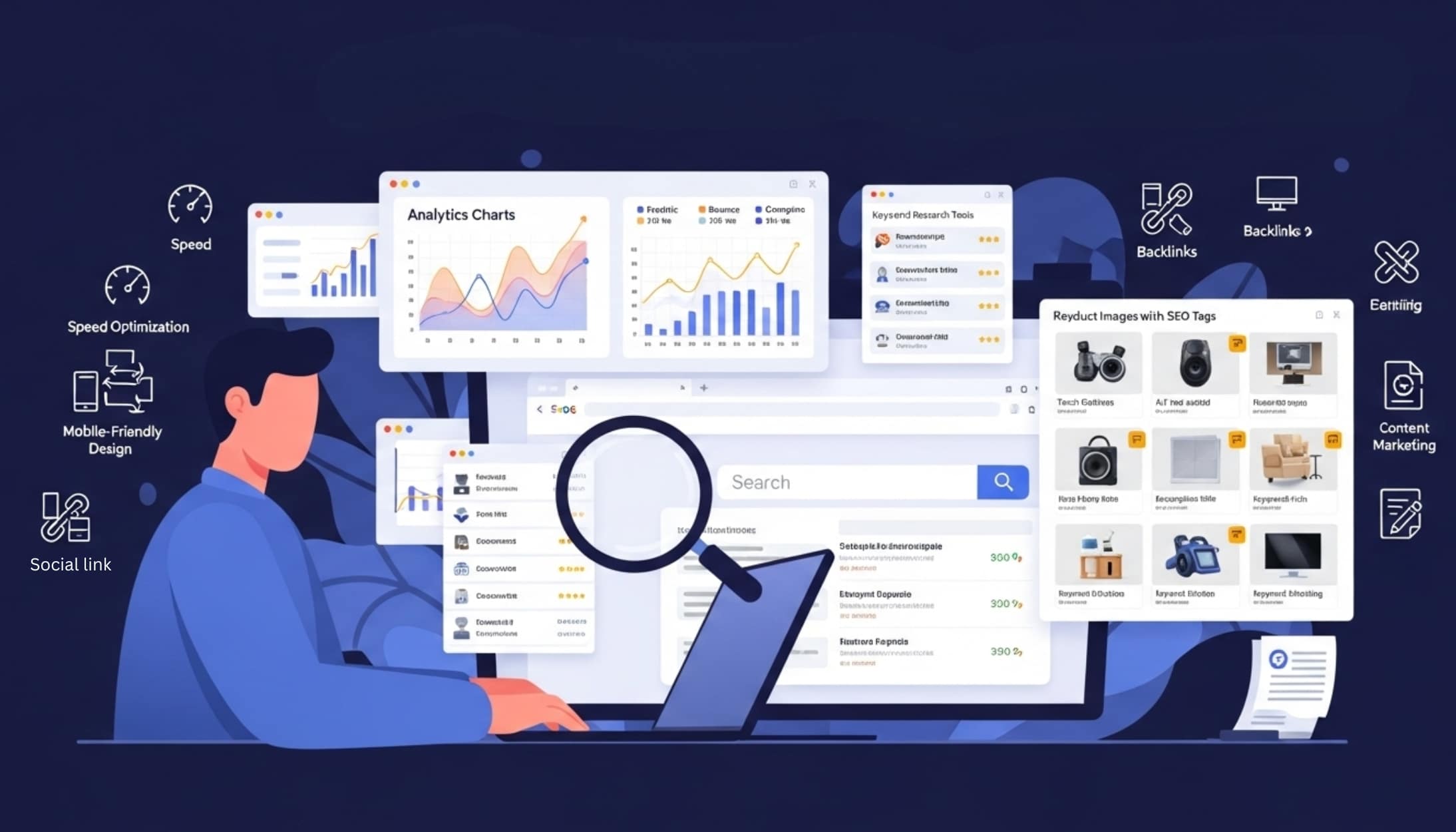Table Of Content
- Introduction to the best ecommerce platforms
- How to Pick the Best Ecommerce Platform?
- Build Your Thriving eCommerce Business with These Essential Criteria
- Different Kinds of Ecommerce Platforms
- The Best eCommerce Platforms: Unveiling the Features of the Top Fifteen
- Must-Have Features for Ecommerce Platforms
- Problems and Limits of Ecommerce Platforms
- Cost of Setting Up an Ecommerce Platforms
- Conclusion
- FAQs
Introduction To The Best Online Ecommerce Platforms
Online shopping has experienced remarkable growth both pre and post-Covid-19 pandemic. As a result, numerous online businesses are on the lookout for the best Online eCommerce platforms. By adopting effective techniques and streamlined procedures, businesses can swiftly initiate online product sales and facilitate seamless payment processing.
These eCommerce platforms for beginners not only enable online businesses to conveniently track their inventory and manage shipping but also offer a diverse range of options. However, choosing the right platform can be challenging due to subtle variations among them, often resulting in a time-consuming selection process.
To simplify this task, we have curated a list of top-notch fifteen eCommerce solutions that cater to specific criteria. This post aims to guide you in building your own eCommerce website based on these recommended platforms.

15 Best Online Ecommerce Platforms For Beginners
- Fathershops
- Shopify
- BigCommerce
- WooCommerce
- Wix
- Squarespace
- Selz
- Square Online
- Ecwid
- Weebly
- Big Cartel
- Sellfy
- Joomla
- AbanteCart
- Volusion
How to Pick the Best Ecommerce Platforms?
Choosing the best ecommerce platform depends on several factors tailored to your business needs. Here are some key considerations:- Business Size and Type: The platform should cater to your business’s current size and have the scalability for future growth.
- Ease of Use: Look for user-friendly interfaces that make managing your online store straightforward.
- Customization and Flexibility: Ensure the platform can be tailored to match your brand and specific business requirements.
- Integration Capabilities: It should easily integrate with other tools and systems like CRM, ERP, and email marketing software.
- Security: Robust security features are crucial to protect sensitive data and build customer trust. Cost: Consider both upfront and ongoing costs, ensuring they align with your budget.
- Customer Support: Reliable customer service is essential for troubleshooting and assistance.
Build Your Thriving eCommerce Business with These Essential Criteria
When trying to figure out which are the best online eCommerce platforms, it is essential to consider specific criteria to ensure optimal return on investment. Careful attention is necessary when selecting a platform to build an online website.
- Pricing: The pricing model of eCommerce platforms plays a crucial role and should align with your budget. It is important to have transparent and easily understandable information regarding the fees charged by developers or the eCommerce platforms. Registration fees typically include monthly fees, payment gateway fees, and transaction fees.
- Accessibility: All eCommerce platforms should offer user-friendly navigation and convenient dashboards. They should provide a setup wizard that guides users through the process of creating their online store. Users must be able to design a modern and responsive online store without requiring coding or graphic design skills. This step is pivotal in establishing your eCommerce business
- 24/7 Customer Support: Customer support is of utmost importance for eCommerce businesses. Platforms should offer support through live chat, phone, and email to cater to customers’ needs promptly and efficiently.
- Integrations: The ability of platforms to seamlessly integrate with other applications and services is essential. The availability of a wide range of integrations allows businesses to select the services they require to conduct their operations effectively.
Different Kinds of Ecommerce Platforms
Ecommerce platforms come in various types, including:- Open-Source Platforms: Highly customizable but require technical knowledge to set up and maintain.
- SaaS (Software as a Service) Platforms: Subscription-based, user-friendly, and hosted on the provider’s servers.
- Hosted Platforms: Where the platform is hosted by a third party, reducing the burden of maintenance.
- Self-Hosted Platforms: Where you host the platform on your server, offering complete control.
The Best Online eCommerce Platforms for beginners: Unveiling the Features of the Top Fifteen
- Fathershops: FatherShops simplifies the dropshipping process, providing a seamless experience for entrepreneurs. Its user-friendly interface and intuitive features allow you to effortlessly manage your inventory, process orders, and track shipments. With FatherShops, you can focus on growing your business instead of getting bogged down by complex logistics.
- Shopify: A market leader in eCommerce platforms, Shopify offers an effortless setup process with the guidance of onboarding experts. Its user-friendly drag-and-drop website builder is ideal for small businesses, providing access to a wide range of apps for social media, marketing, and sales reporting. With Shopify, you can seamlessly handle all aspects of your business, making it suitable for beginners and professionals alike.
- BigCommerce: Known for its robust website builder, BigCommerce allows for extensive customization, ensuring your online shop reflects your unique vision. It caters to large brands and businesses with high-volume inventories, offering comprehensive product listings and enhanced search functionality. As a fully hosted platform, BigCommerce prioritizes performance without compromise.
- WooCommerce: Packaged with Storefront, WooCommerce is a highly customizable eCommerce platform for beginners that enables you to effortlessly embed products, categorize them, and optimize SEO. With unlimited products and images, WooCommerce offers a cost-effective solution and excellent customer support, ensuring your online store stands out.
- Wix: Boasting a modern and user-friendly website builder, Wix provides a comprehensive solution for smaller businesses and aspiring entrepreneurs. The platform’s third-party app and extensions marketplace offers a wide range of features, including shipping management, accounting tools, and social commerce integrations, empowering you to create a complete eCommerce website.
- Squarespace: Ideal for small businesses seeking an attractive yet budget-friendly website builder, Squarespace offers a variety of themes to kickstart your eCommerce venture. It incorporates an inventory management system and facilitates tasks such as setting offers and managing email listings. With Squarespace, you have complete control over your online presence.
- Selz: Renowned as a cost-effective and one of the best eCommerce platform, Selz provides standard and pro plans to suit your business needs. With its array of themes, intuitive user interface, and 24/7 customer support, Selz makes it easy to design and launch your website. The emphasis on user-friendly tools ensures a seamless website-building experience for your business.
- Square Online: It is renowned for its strength in omnichannel selling, seamlessly integrating online and offline sales. This platform is particularly beneficial for businesses that already use Square for point-of-sale (POS) transactions, as it allows for easy synchronization of sales and inventory across physical and digital channels.
- Ecwid: It stands out as a highly versatile ecommerce solution that can be added to existing websites. It’s not a standalone website builder but rather a widget that integrates with your current site, making it an excellent choice for businesses looking to add ecommerce functionality to their existing online presence.
- Weebly: It is known for offering great value, providing a balance of user-friendly design tools and essential ecommerce features at an affordable price. It’s a solid choice for small businesses or individuals who are just starting with online selling.
- Big Cartel: It is specifically tailored for artists, makers, and creatives. It offers a simple platform to sell unique, handmade, or limited edition items. Its ease of use and minimalist design make it a favorite among creatives who want a no-fuss solution to sell their work.
- Sellfy: Great for Selling Downloads Sellfy makes it easy to sell things you can download, like ebooks or music. You can also sell regular items. It has a cool feature where customers can pay what they want, as long as it’s more than a set minimum. This is good for getting donations or trying out new prices.
- Joomla!: Good for Making Your Site Your Way Joomla lets you build a website the way you want. It’s not just for selling things. To sell stuff, you add a special part to your site, like you do with WooCommerce in WordPress. It’s for people who want to change a lot of things on their website.
- AbanteCart: Easy for Beginners AbanteCart is simple to use and great for people who are new to selling things online. It has everything you need to start, like managing different stores and changing how your products look. It’s a good choice if you’re starting out.
- Volusion: Best for People Who Sell Without Stock Volusion is easy and quick to use for making an online store. It’s especially good for dropshipping, where you sell things but don’t keep them in stock yourself. It has special tools for this and helps you keep track of items that people put in their cart but didn’t buy.
Must-Have Features for Ecommerce Platforms
A good ecommerce platform should include:- Mobile Compatibility: With the rise of mobile shopping, your platform must be optimized for mobile devices.
- SEO Features: Tools to help your store rank higher in search engine results are vital.
- Payment Options: Offering multiple payment gateways provides convenience to a wider range of customers.
- High-Level Security: Features like SSL certificates to ensure secure transactions.
- Analytics and Reporting Tools: To track performance and customer behavior.
- Customer Support Options: Such as live chat and email support for customer inquiries.
Problems and Limits of Ecommerce Platforms
Common challenges include:- Scalability Issues: Some platforms may not handle a growing number of products or increased traffic efficiently.
- Integration Difficulties: Problems when integrating with other systems or software.
- Limited Customization: Certain platforms may offer limited options for customization.
- Security Vulnerabilities: Keeping up with security updates and protecting customer data can be challenging.
- Technical Difficulties: Requires a certain level of technical expertise to manage and troubleshoot.
Cost of Setting Up an Ecommerce Platforms
The cost of setting up an ecommerce platform is a critical consideration for businesses venturing into online sales. It’s not a one-size-fits-all scenario; costs can vary significantly based on various factors. Let’s delve deeper into each of these factors:
Platforms Type
- Open-Source Platforms: Examples include Magento and WooCommerce. While the software itself is often free, the real cost lies in customization, integration, and hosting. You’ll need a development team to set up, customise, and maintain the platform. Long-term costs include developer fees, updates, and potential scalability enhancements.
- SaaS Platforms: Platforms like Fathershops or BigCommerce charge a monthly subscription fee. This fee usually includes hosting, security, and some level of customer support. While easier to set up and maintain, costs can increase with higher plans offering more features or as sales volume grows.
- Custom-Built Platforms: Tailor-made solutions can be the most expensive, involving developers to build and maintain a unique platform. This is usually opted for by large businesses with specific needs that off-the-shelf platforms can’t meet.
- Basic vs. Advanced Features: Basic features might include product listings, shopping cart functionality, and basic analytics. Advanced features like AI-driven recommendations, advanced analytics, and automated marketing tools come at a higher cost.
- Customization: Personalising themes, adding custom functionalities, or integrating unique payment gateways can add to the expense. The more you cust
Features and Customization
Hosting
- Hosted Platforms (SaaS): Here, the hosting cost is typically included in the monthly subscription fee. These platforms manage the technical aspects of hosting, ensuring uptime and security.
- Self-Hosted Platforms: With platforms like Magento or a custom solution, you’ll need to find and pay for your hosting service. Costs can vary based on the required server capacity, bandwidth, and level of support. High-traffic sites need robust hosting solutions, which are more expensive.
Maintenance and Support
- Regular Updates: Ecommerce platforms require regular updates for new features, security patches, and bug fixes. While SaaS platforms handle this within their subscription fee, open-source or custom platforms may incur additional costs for a developer to update and maintain the site.
- Customer Support: SaaS platforms often provide customer support as part of their subscription. For open-source or custom platforms, you might need to hire external support services or train an in-house team, leading to additional expenses.
- Security: Ensuring robust cybersecurity can incur costs, especially for self-hosted platforms. This includes SSL certificates, regular security audits, and compliance with standards like PCI DSS for payment processing.
Additional Considerations
- Marketing and SEO Tools: While some platforms include basic tools that is free to use. Whereas some online ecommerce platforms might require additional investments in tools or services like advanced marketing and ecommerce SEO
- Payment Processing Fees: Each transaction can incur fees, depending on the payment gateway used. Some platforms have their payment services, while others integrate with third-party providers.
Read More
- Learn How to Build an SEO-Optimized eCommerce Website
- Step-by-Step Guide to Open Your Online Store
- Step-by-Step Guide to Start Your Own eCommerce Business
- Checklist to Launch Your eCommerce Business Successfully
- Explore Different eCommerce Business Models for Success
- Discover the Best Shopify Alternatives for Your eCommerce Store
- Follow this Complete SEO Checklist to Boost Your eCommerce Store
- Improve Your eCommerce Customer Service for Better Retention
- Discover Proven Ways to Increase Your eCommerce Sales
- Build Your eCommerce Site with a No-Code Website Builder
Conclusion
The world of eCommerce platforms offers a diverse range of options to cater to various needs and preferences. From comprehensive solutions designed for international online stores with extensive product catalogs to specialized platforms tailored for sellers with a select few items, there is something for everyone. The key focus of the best eCommerce platforms lies in their ability to empower businesses to sell online effectively.
FAQs
Which is the best ecommerce platform for beginners?
Fathershops is widely regarded as one of the best ecommerce platforms for beginners. It’s user-friendly, with an intuitive interface and a simple setup process. Fathershops offers a range of customizable templates, integrated payment processing, and essential ecommerce features that are easy to manage without technical expertise. Additionally, it provides robust support and a host of resources to help new users get started.
Can I use WordPress for ecommerce?
Yes, you can use WordPress for ecommerce by integrating WooCommerce, a popular ecommerce plugin. WooCommerce transforms a WordPress website into a fully functional online store, offering features like product listings, shopping carts, and secure payments. It’s highly customizable and suitable for businesses of all sizes, though it requires some basic understanding of WordPress.
Do I need technical skills to set up an ecommerce website?
Not necessarily. Platforms like Fathershops, BigCommerce, and Wix are designed for users without technical skills. They offer drag-and-drop builders and pre-designed templates, making it easy to set up an online store. However, if you need a highly customized site or specific integrations, some technical knowledge might be beneficial.
How much does it cost to set up an ecommerce platform?
The cost varies widely depending on the platform and your specific needs. Basic plans on platforms like Fathershops or BigCommerce can start around $20-$30 per month. However, costs can increase with added features, custom designs, or third-party integrations. Also, consider additional expenses like domain registration, SSL certificates, and transaction fees.
Is it better to use a hosted or self-hosted ecommerce platform?
It depends on your business needs and technical ability. Hosted platforms (like Fathershops or BigCommerce) handle the hosting, security, and maintenance, which is ideal for those who prefer simplicity and support. Self-hosted platforms (like WooCommerce for WordPress) offer more control and customization but require managing hosting, security, and updates yourself.
Can I sell on multiple channels with an ecommerce platform?
Yes, many ecommerce platforms offer omnichannel selling capabilities. This means you can sell not only on your website but also on social media, marketplaces like Amazon or eBay, and even in physical locations. Platforms like Fathershops and BigCommerce have built-in features or integrations that make it easy to manage sales across multiple channels.
What security features should I look for in an ecommerce platform?
Key security features include SSL certificates (for secure data transmission), secure payment gateways, PCI compliance (for credit card processing), and regular security updates. Ensure the platform has a strong reputation for security and offers robust measures to protect both your business and customer data.
Can I switch ecommerce platforms if my business outgrows the current one?
Yes, it’s possible to switch ecommerce platforms, but the process can be complex. It involves migrating products, customer data, and content to a new platform. Some platforms offer migration tools or services to facilitate this process. It’s crucial to plan the transition carefully to minimize disruptions to your business.



 Free No-Code Website Builder
Free No-Code Website Builder



